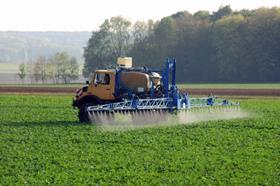
Europe’s crop protection industry (ECPA) has adopted a set of commitments to support Europe’s new Green Deal, including an investment of over €14bn in new technologies and more sustainable products by 2030.
In addition to this investment, ECPA is also planning to ramp up waste collection and increase the levels of training among farmers in Europe as part of its response to the EU’s Farm to Fork and Biodiversity strategies.
“With its ambitious European Green Deal, the European Commission has fired the starting gun for the EU’s run towards a more sustainable, climate-neutral future,' said Géraldine Kutas, European Crop Protection Association director general. “We are serious about contributing and aligning with the Green Deal policy initiatives which is why our companies have joined together to set our own voluntary, sector-specific, measurable goals in their support.”
According to ECPA, the six commitments it has adopted will guide the sector for the next decade in key areas of agricultural innovative technologies, the circular economy and better protection of people and the environment.
ECPA outlined these commitments as follows:
Innovation & Investment: By supporting innovation and the deployment of digital and precision tools as well as biopesticides, we further the European Commission’s ambition of a digital and green recovery. By 2030 we will be investing €10bn into innovation
in precision and digital technologies and €4bn into innovation in biopesticides. All the investment the industry is committing to is only useful if there is the appropriate regulatory framework allowing the innovation to reach the European farmers.
Circular Economy: By increasing the collection rate of the empty pesticides plastic containers to 75 per cent and establishing a collection scheme in the EU Member States that currently have none by 2025, we will contribute to the EU’s goal of a circular economy that aims at minimising waste and resources used, lessening the environmental impact of plastic packaging.
Protecting People & Environment: By training farmers on the implementation of Integrated Pest Management, water protection and the importance of personal protective equipment (PPE), our industry desires to further minimise exposure and reduce the risks of pesticide use, all while contributing to the overall goals of the Sustainable Use Directive and EU Farm to Fork strategies aiming at producing enough food sustainably.
'We all agree on the direction of travel, what’s important now is making those deliberate steps to reach the end goal,' Kutas added. “These commitments will be challenging for our companies to deliver on. However, we are committed to deliver on what we have set out for and call on the European Commission to support sustainable agriculture with appropriate regulatory framework allowing the innovation to reach the farmers.
“This is just the beginning, we will be tracking our industry’s progress over the decade and sharing transparently how far we have come,' she concluded.



